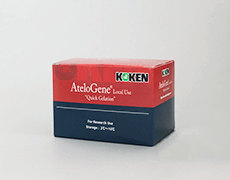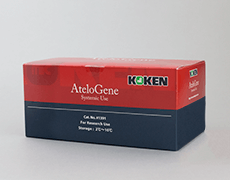Newsletters
Sustained-release transfection reagent AteloGene for suppression of adipose differentiation
10 July 2018
In this edition of the newsletter, we introduce a paper describing research on suppression of adipocyte differentiation using a sustained-release transfection reagent for an in vivo experiment called AteloGene Local Use.
Local administration of siRNA into mouse epididymal adipose tissue
Article information
Theobromine suppresses adipogenesis through enhancement of CCAAT-enhancer-binding protein β degradation by adenosine receptor A1.
Mitani T, Watanabe S, Yoshioka Y, Katayama S, Nakamura S, Ashida H.
Biochim Biophys Acta. 2017 Dec;1864(12):2438-2448. PMID: 28965824
Overview
Obesity is a serious health problem that increases the incidence of cardiovascular disease, hypertension and type II diabetes in both developed and developing countries.
Suppression of adipocyte differentiation is considered to be an effective strategy for the prevention and treatment of obesity, because an excessive increase in adipocyte number and size in adipose tissue leads to obesity.
In addition, theobromine is a type of methylxanthine contained in cocoa beans that has health benefits such as increasing the blood concentration of apolipoprotein A-1 and HDL-cholesterol and suppressing diabetic kidney disease.
However, the influence of theobromine on the differentiation of adipocytes and its mechanism of action has not yet been clarified.
Therefore, the authors evaluated the influence of theobromine on adipose tissue weight and adipogenesis of mice and showed body weights were lower in the theobromine orally administered group than that of the control group. In addition, theobromine suppressed weight gain in both epididymal and perirenal adipose tissues.
Also, in order to investigate whether theobromine reduces accumulation of fat via the AR1 signal, AR1 siRNA was administered into mouse epididymal adipose tissue using AteloGene. The administration of AR1 siRNA prevented the suppression effects on fat mass and adipocyte size mediated by theobromine.
Furthermore, it was found that administration of AR1 siRNA decreased the effect of theobromine on the protein expression of lipogenesis-related proteins such as PPARγ, C/EBPα and FAS.
Therefore, it was suggested that theobromine could potentially become a therapeutic agent to suppress obesity as a phytochemical with anti-adipogenic effects.
Improvement of AteloGene Local Use yields increased gelation speed at the site of administration and enhanced transfection efficiency
Product Name
– AteloGene Local Use “Quick Gelation” (Cat. No.: #1492 for Cosmo Bio customers)
(Cat. No.: #1494 for REPROCELL customers)

